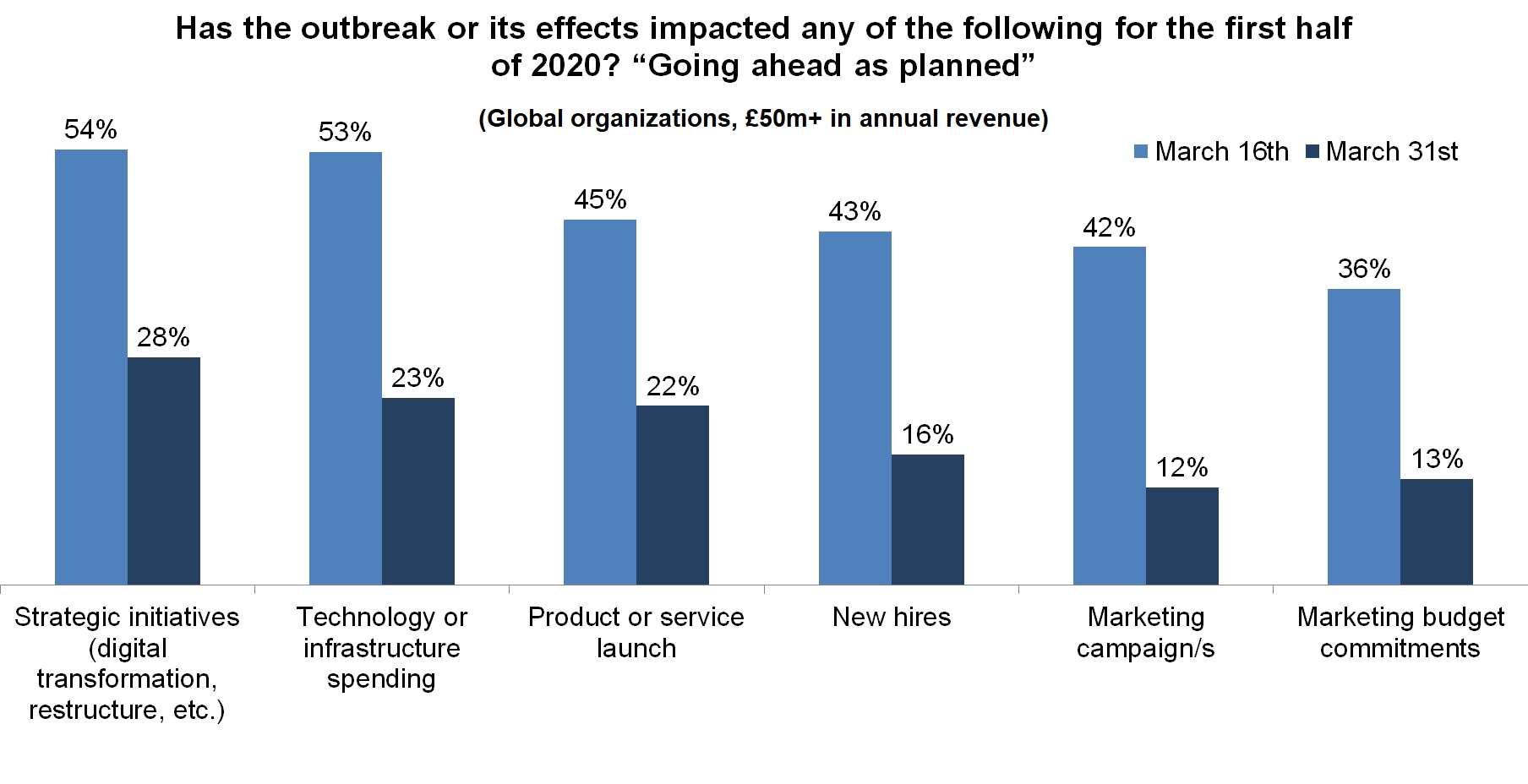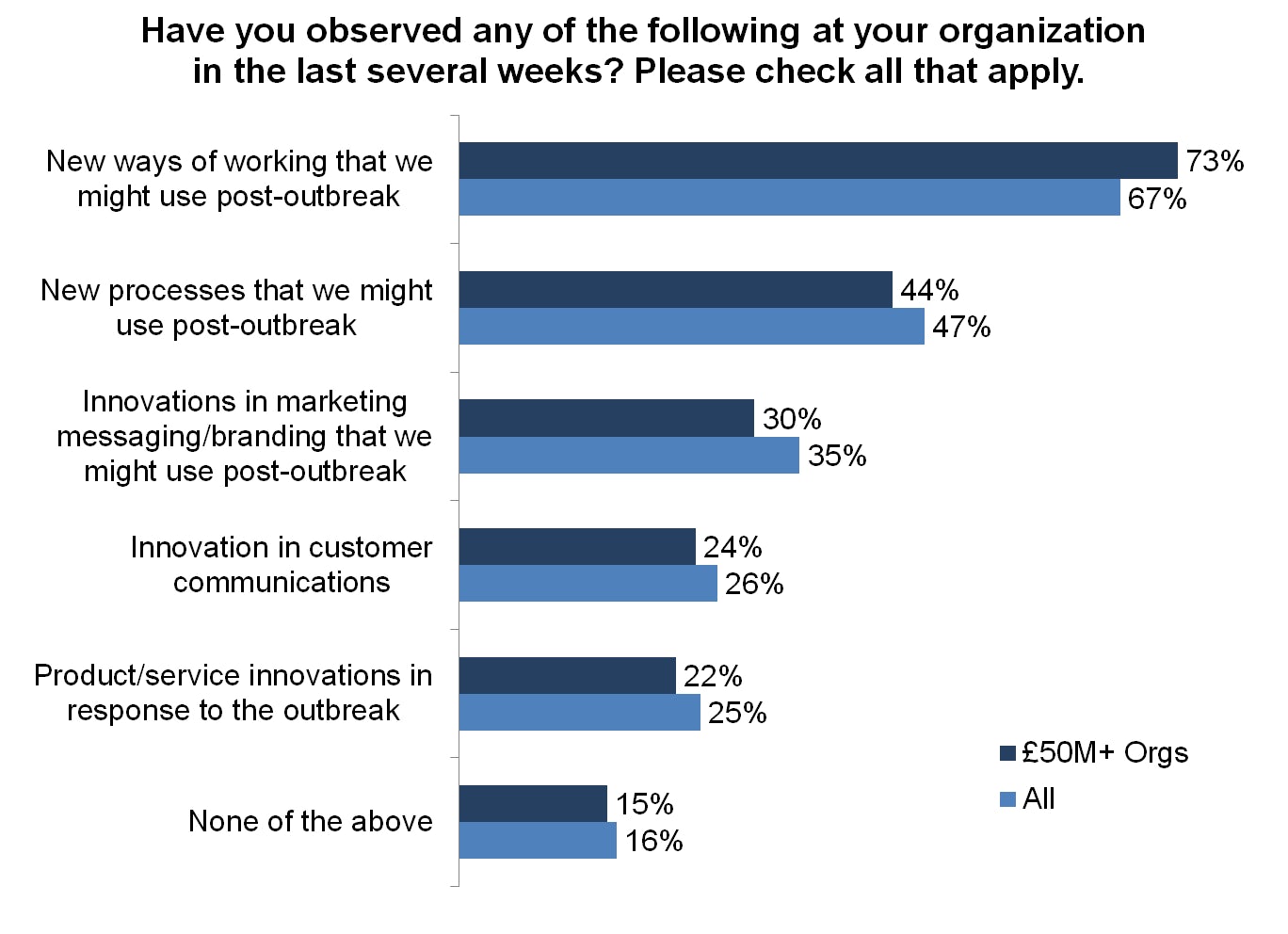The initial survey, carried out on 16th March, revealed how marketers felt about working remotely due to the pandemic, the potential for delays to product and service launches and digital transformation investment, the major concerns of large enterprises versus SMEs about the impact of remote working, and much more.
As we all know, events have progressed extremely rapidly since the crisis began to unfold, and what was true a fortnight ago probably doesn’t hold true any more.
A follow-up survey, carried out on 31st March, starkly illustrates just how much has changed for businesses in two weeks, with demand for products and services, marketing campaigns, and marketing budgets severely reduced – but with some surprising bright spots in the way that companies are innovating on their products and processes.
A blow to product and service demand, marketing campaigns and marketing budgets
While it comes as little surprise to anyone that businesses are experiencing lowered demand as a result of the coronavirus crisis, it is still sobering to note how much this has escalated in the space of just two weeks.
Among global businesses with annual revenues of more than £50 million, 35% noted in the first survey that they had experienced lowered demand for products and services – but this figure has since leapt up to 64%, almost two-thirds of respondents.
As a result, marketing campaigns and budgets are being severely impacted. Just 12% of respondents to the 31st March survey say that marketing campaigns are “going ahead as planned” – down from 42% on the 16th March, a drop of 30 percentage points. A similarly dismal 13% say that marketing budget commitments are going ahead as planned, down from 36% two weeks ago.
New hires, product or service launches, technology and infrastructure spending and planned strategic initiatives like digital transformation have all taken similar hits, although in slightly more encouraging news, the largest percentage of respondents – 28% – say their businesses are still going ahead with planned strategic initiatives like digital transformation or restructuring, while 23% say they are still going ahead with technology or infrastructure spending.

In the wake of the previous survey, I wrote about how digital transformation investment is more crucial now than ever before, as usage of products and services shifts from the physical world to the digital one – requiring many brands to get creative about how they deliver their product to consumers, and/or rely more heavily on their digital infrastructure than they ever might have expected to.
However, investment in marketing will also play a crucial role in businesses’ ability to reach consumers in the midst of a global crisis – and their ability to come through it, which makes the slim percentage of large enterprises going ahead with planned marketing budgets all the more concerning.
How are organisations adapting to the changed environment?
How have organisations’ processes and the way they deliver to customers changed to accommodate the ‘new normal’? On 16th March, less than three-fifths (59%) of respondents from large enterprises said they had changed employee policies around things like remote work, travel and bonuses to accommodate the situation. Now, an overwhelming 95% say they have.
A similarly high percentage – 88% – of enterprises report that they have created a dedicated team to deal with the impact and implications of COVID-19, up from 61% two weeks ago. And just over two thirds (67%) of global enterprises report that they have changed their marketing strategy in some way – through discounts, messaging, partnerships, or similar – in light of the situation, a 41 percentage point increase from the 26% who had done so a fortnight ago.
More than half of global enterprises (52%) report changing customer policies regarding things like cancellation terms, or by waiving fees; just under half (48%) also report having changed their policies for vendors, by extending timelines or terms of payment. This is up from 24% and 22%, respectively, two weeks ago.
With 95% of large organisations globally having changed their policies around things like remote work and travel, what impact has this had on employee productivity? Encouragingly, the percentage of large enterprises reporting that their productivity has been affected by travel restrictions and new processes has gone down slightly, from 60% two weeks ago to 58%, as teams settle into the new way of working. Respondents from large enterprises also reported a drop in absenteeism, from 21% two weeks ago to 13%.
The majority of respondents from large enterprises also report being at least as efficient (34%) as they were before the crisis, if not more so (22%), with 44% of respondents reporting that they are “less efficient than normal”.
It seems that these ways of working may well be maintained even after the outbreak has passed, with 73% of large enterprises saying that over the last several weeks, they have observed new ways of working in their organisation that they might use post-outbreak. Forty-four percent have also observed new processes that they might use post-outbreak.
More than three quarters (76%) also reported some kind of innovation in response to the outbreak that they might use afterwards, whether it be in marketing messaging or branding (30%), customer communications (24%) or product or service innovations (22%).

Under the circumstances, it appears that marketers are doing what they can to adapt and even innovate in response to the unfolding global crisis, and many of the results are encouraging, particularly in terms of teams changing their approach to work, maintaining efficiency, and even managing to find new ways of delivering their product, messaging or branding.
The main point of concern is just how much marketing budgets seem to have dwindled amidst the crisis – even among large, well-resourced organisations. And while it’s unsurprising that cuts are being made to spending, now more than ever companies need to focus on building their brands, putting out positive and worthwhile messages into the world, and finding ways to reach customers with the new innovations they’ve developed.
The post Marketing in the coronavirus crisis: how are enterprise organisations adapting to the “new normal”? appeared first on Econsultancy.

Be First to Comment